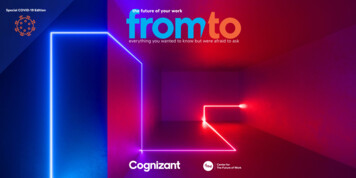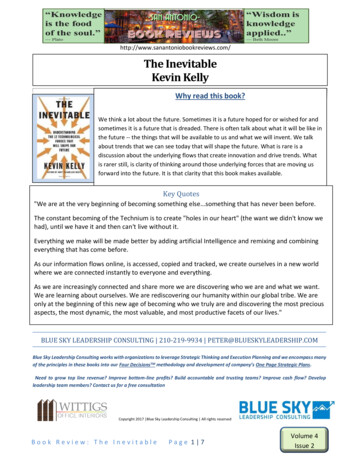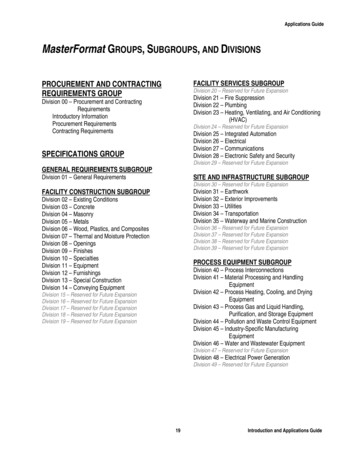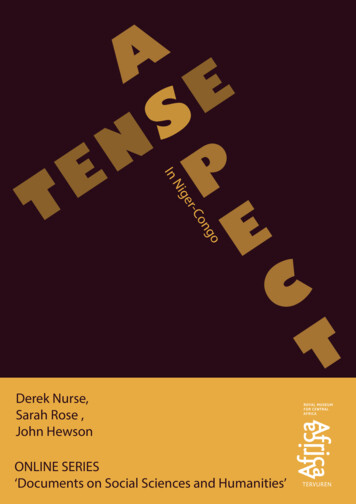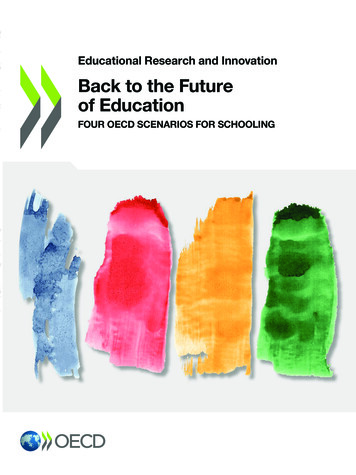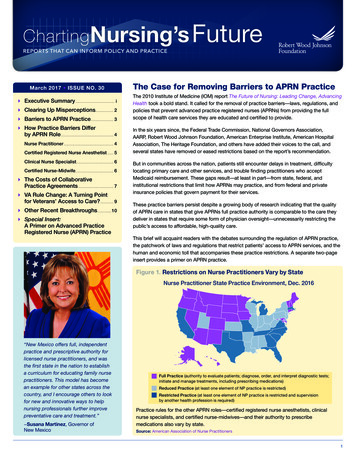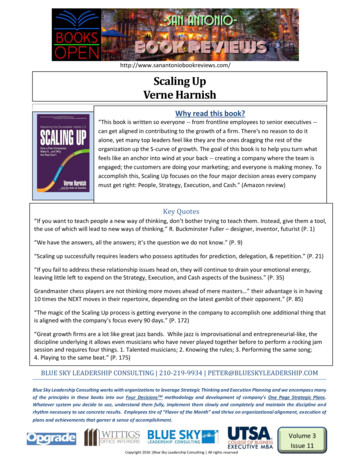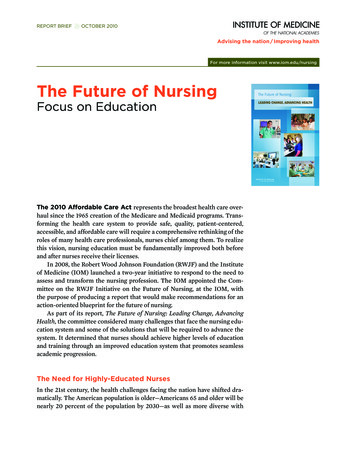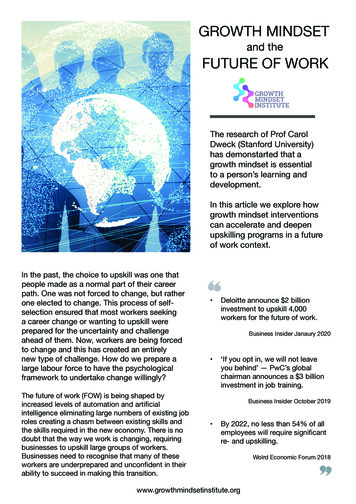
Transcription
GROWTH MINDSETand theFUTURE OF WORKThe research of Prof CarolDweck (Stanford University)has demonstarted that agrowth mindset is essentialto a person’s learning anddevelopment.In this article we explore howgrowth mindset interventionscan accelerate and deepenupskilling programs in a futureof work context.In the past, the choice to upskill was one thatpeople made as a normal part of their careerpath. One was not forced to change, but ratherone elected to change. This process of selfselection ensured that most workers seekinga career change or wanting to upskill wereprepared for the uncertainty and challengeahead of them. Now, workers are being forcedto change and this has created an entirelynew type of challenge. How do we prepare alarge labour force to have the psychologicalframework to undertake change willingly?The future of work (FOW) is being shaped byincreased levels of automation and artificialintelligence eliminating large numbers of existing jobroles creating a chasm between existing skills andthe skills required in the new economy. There is nodoubt that the way we work is changing, requiringbusinesses to upskill large groups of workers.Businesses need to recognise that many of theseworkers are underprepared and unconfident in theirability to succeed in making this transition. Deloitte announce 2 billioninvestment to upskill 4,000workers for the future of work.Business Insider Janaury 2020 ‘If you opt in, we will not leaveyou behind’ — PwC’s globalchairman announces a 3 billioninvestment in job training.Business Insider October 2019 By 2022, no less than 54% of allemployees will require significantre- and upskilling.www.growthmindsetinstitute.orgWolrd Economic Forum 2018
Businesses are investing billions in upskillingprograms without considering people’spsychological resistance to change. Byspending a small fraction of their overallinvestment in preparing people to embracethe future as a world of possibility, businessescan accelerate and de-risk their future of workprograms.Transitioning from a role where you arecompetent to a role where you are conciouslyincompetent is a stressful event for mostpeople. Research has demonstrated that forthose doubtful of their ability to succeed andafraid of failure, the experience is extremelyanxiety provoking. Unfortunately, this meansthat some workers will give up beforeattempting to learn a new role and others, whoare fearful of failure but decide to upskill, willfind ways to navigate through the experiencewithout realizing their full potential. As a result,fear of failure can undermine a company’seffort to develop the skills and talents requiredfor the future.When asked about whatthey think about the futureworld of work, office workerssaid they are mostly excited(37%) and see a world ofpossibilities.There is a strong correlation between a fear offailure and perceived competency (McCaffrey2012). The research suggests that people thatperceive themselves to have low competenceare more likely to procrastinate or abandontheir goals due to a fear of failure. Whilethose that perceive themselves as competenttend not to procrastinate and exhibit greatermotivation and goal pursuit.Believe in your own abilityThe research suggests that one must addressa person’s beliefs about their ability to developnew skills and knowledge in order for them toengage in their learning. Failure to develop thisbelief in people will undermine any investmentin upskilling. Yet, few businesses invest timeor resources in getting people to be changeready. There is this belief that businessessimply need to make the training available andpeople will embrace the challenge. This is whymost FOW programs are failing to deliver thebenefits businesses are so keen to realise.Businesses need to build the psychologicalfoundations that underpin a learner’s beliefthat they can be competent in the future, evenif they aren’t competent today.Two thirds of the work forcearen’t ready for the changesfacing them.A PwC report on the future of work states thatonly 37% of office workers see the future ofwork as a world full of possibility and believethey will be successful. Our experience isconsistent with this finding. Remarkably, thismeans two thirds of the work force are illprepared for the demands of upskilling.Developing self-efficacy, a belief that one hassome control over future events, is essentialfor workers being asked to develop newcapabilities. Without self-efficacy individualsare less likely to be successful in buildingnew capabilities. Conversely, should theseindividuals do well, they build greater selfefficacy and can apply this to future challenges(Bandura, 1977).Fixed verses growth mindsetOne proven concept for helping individuals toincrease their self-efficacy, overcome a fear offailure and instil in them a belief that they canbecome competent in the future is Prof. CarolDweck’s work on growth mindset. A personwith a growth mindset believes that theirtalents, skills, abilities and personality can bedeveloped through hard work, good strategies,learning from mistakes and getting input fromothers. Growth Mindset Institute 20202
A person with a fixed mindset believes thattheir basic qualities like their intelligence, theirtalents and their abilities, are fixed traits. Theyhave a certain amount of talent or intelligenceand that is that.In short, a person with a fixed mindset abouttheir ability to become competent in a subjectarea is very unlikely to even start the processof upskilling let alone navigate through thechallenges they will encounter. However, aperson with a growth mindset in a subject areawill believe that they can become competentover time and will persist even when they havea setback. Research has demonstrated thatpeople with a growth mindset have greaterself-efficacy in goal pursuit (Dweck 2008).While this may sound like a dichotomy, aperson is either one or the other, currentresearch indicates that we are all a mixtureof both mindsets. We have areas where webelieve we have high potential and areaswhere we believe that our potential is limited.When a person applies a growth mindset toa new challenge, they are more resilient andsee setbacks as a necessary part of gettingbetter. Whereas, when a person applies a fixedmindset to a new challenge they are definedby their failures and their motivation diminisheswith each setback.Prof. Blackwell and Prof. Dweck workedclosely with students that were strugglingwith maths. These students were disengagedand underperforming. The students haddeveloped a fixed mindset about their mathsability. They believed that they weren’t goodat maths and never would be. When thesestudents encountered new material that waschallenging it reinforced this belief about theirfixed maths ability (Blackwell, Dweck 2007).They gave one group of students training onstudy skills, tips for how to learn maths better,and the other group received training aboutgrowth mindset designed to change theirbelief about their maths ability. Students inthe first group continued to underperform inmaths and their maths scores continued todecline putting them at a much greater risk ofnot graduating. The students that received thegrowth mindset training became moreengaged in maths subjects and theirperformance continued to improve over time.This study demonstrates that investing intraining programs when people have a fixedmindset about their ability will be ineffective.The good news is that it is possible to developin people a new belief system through growthmindset interventions, thus preparing them forthe challenges ahead. If someone believes “Iam just not good at computer programming,”then sending them to a code camp to learn tocode without first addressing their mindset iswasted effort.Focus on the fixed mindsetIt turns out that simply telling people aboutthe growth mindset and its benefits doesn’tactually change their underlying mindset.Helping someone to change their mindsetisn’t about giving them knowledge, it isabout changing their beliefs and behaviours.This requires FOW programs to change aperson’s core psychological framework towardupskilling. The ability to do this at scale hasenormous implications for FOW programs.Prof. Dweck and the GrowthMindset Institute haveidentified eight core mentalmodels that tend to triggera fixed mindset response inpeople.Current research suggests that in order tocreate a change in people it is more effectiveto make them aware of their fixed mindsetbeliefs and behaviours. Prof. Dweck and theGrowth Mindset Institute have identified eightcore mental models that tend to trigger a fixedmindset response in people.They termed these eight mental models fixedmindset triggers because they consistentlyinvoke a fixed mindset response in people. Afixed mindset trigger is a pattern of thoughtthat leads to maladaptive behaviours suchas procrastination, avoidance and giving up.Most people have at least one dominant fixedmindset trigger. Growth Mindset Institute 20203
8 Fixed Mindset Triggers Mindset Beliefs High Effort Challenges Setbacks Success of Others Comfort Zone Feedback Grit5,000 people assessedDweck and Growth Mindset Institute assessed5,000 people to identify and validated eightfixed mindset triggers in 2018/19. A briefdescription of each trigger is as follows:1.Mindset Beliefs – If one believes thattheir intelligence, talents and personality,and that of others, can’t change very muchthen their willingness to learn new skills islower than those who believe these aspectsof who they are can be developed. If one hasa belief that their ability in a subject area islimited, then they have a perception of lowcompetence and hence will exhibit avoidanceand procrastination behaviours. Their fear offailure will rule them.2.High Effort – A person with a higheffort trigger believes that things should comeeasily for them and that success should bequick and effortless. If one has to work hardat something, then it means they will neverbe good at it. This also leads to avoiding higheffort tasks and procrastination.3.Challenges – This trigger appears whenone doesn’t like tasks where the outcomeis uncertain or where they perceive a risk offailure. This trigger is closely associated with afear of failure and is correlated with lower selfefficacy. This results in avoidance behaviour. Ifthey don’t try, then they can’t fail.4.Setbacks and Failure – Someonethat has a setback trigger can bedisproportionately affected by a setback orfailure. This can lead to a lack of confidencein one’s abilities, which in turn leads to a dropin motivation, and in some cases giving up.They may be fine working hard and embracinguncertainty, but when the actual setbackoccurs their self-doubt holds them back.5.Success of Others – This trigger occurswhen a person wants to be perceived asbeing more competent than those aroundthem. They would prefer to be the star of theteam and tend to need more recognition thanothers. Their goal is to look good as opposedto getting better.This can lead to avoiding tasks that threatento expose their weaknesses and hiding theirdeficiencies.6.Comfort Zone – A person with acomfort zone trigger gets anxious aboutunfamiliar situations or tasks that demandthem to develop new skills. Especially, whenthey perceive they are being judged and maybe embarrassed if they don’t perform well. Themore divergent the task is from their currentskills and abilities, the stronger is their fixedmindset response. This trigger leads to gettingstuck in a rut and avoiding new situations.7.Feedback – Those with a feedbacktrigger experience anxiousness in feedbacksituations. They tend to avoid feedback orseek to invalidate feedback. They perceivefeedback to be criticism about their abilitiesverses knowledge about how they couldimprove. They can sometimes get defensive,angry or over sensitive when getting feedback.Research demonstrates that a fixed mindsettoward feedback impedes their progress asthey have less ability to identify errors andcorrect them (Moser 2011).8.Grit – People with a grit trigger suffer adrop in motivation when they have to managetasks that require a long time to complete ortasks in which they have little interest. Theystart off new projects full of enthusiasm, butover time their motivation wanes and theystruggle to maintain their effort. They canleave tasks unfinished or the quality of theirwork can suffer under these circumstances(Duckworth 2007). Growth Mindset Institute 20204
People’s triggers play out in different wayswhen faced with the need to upskill. Fearof failure is commonly associated with achallenge trigger, but people with a grit, higheffort or comfort zone trigger are also proneto having a fixed mindset response to thesesituations. While those with a feedback triggermay become anxious and avoid opportunitiesto learn or fail to recognise what they need todo to improve. Especially, when they feel thattheir abilities are being judged.A person with a setback trigger will find itdifficult to maintain momentum if they maketoo many mistakes while developing a newcompetency. If someone believes that aparticular skill requires a certain level of naturaltalent, and they judge themselves to lack thattalent, their self-efficacy will be low. Imaginetrying to teach someone complex math skills ifthey believe that they are no good at math andnever will be.Fixed mindset triggers actas psychological barriers tolearning.A person’s fixed mindset triggers affectthe choices they make by influencing theirperceptions about their competency, leadingto lower self-efficacy and a fear of failure.Gone unrecognised and unmanaged, aperson’s future potential can be severelylimited by their fixed mindset responses.This can have a significant impact on thesuccess of FOW programs. Researchdemonstrates that a growth mindset isessential for learning and development (Dweck2008). A fixed mindset undermines attemptsto upskill by creating a psychological barrierto learning. Overcoming this barrier is criticalto developing people’s capacity to changeand have the self-efficacy to persist through achallenging transition.Evidence mindsets can be changedawareness in people about their fixed mindsettriggers and assisting them to recognise whenthey are at play. Once a person recognisestheir fixed mindset triggers, they are able todevelop strategies to manage back towardgrowth. This accelerates performance andacts as a multiplier for investment in upskillingpeople.It is not enough to provide people withnew knowledge without addressing thepsychological barriers that will prevent themfrom applying that knowledge effectively.This is where many FOW programs fall shortand fail to achieve the large-scale changethat is required. Change at an enterprise levelis the sum of change at an individual level.Unfortunately, most businesses fail to developa strategy for how to achieve this at scale.People with a growth mindsetdevelop a thrive mentalitybelieving that the future holdsgreater potential to learn andgrow their skills.Research into this aspect of FOW is stilldeveloping, but we know that a fixed mindsethinders people’s ability to adapt and change.When confronted with uncertainty about thefuture and challenging environments, peoplewith a fixed mindset adopt a survive at all costmentality. They seek to maintain the statusquo and resist change. People with a growthmindset develop a thrive mentality believingthat the future holds greater potential to learnand grow their skills. They are optimistic aboutthe future and see the greater opportunitiesmade possible by a changing world.Change at an enterprise levelis the sum of change at anindividual level.Fortunately, there is strong evidence thatmindsets can be changed by developing self Growth Mindset Institute 20205
Mindset interventions can scaleDeveloping a more persistent growth mindsetin people has the potential to increase theeffectiveness of upskilling programs. Mindsetinterventions have demonstrated that theycan overcome a fear of failure by increasinga person’s belief that they can becomecompetent in new areas of learning. Thisimproves their self-efficacy leading to greatertenacity when they encounter a challenge orsetback (Yeager 2013).Research indicates thata growth mindset can bedeveloped at scale.For more infomration on growth mindsetprograms for your business visit us at:www.growthmindsetinstitute.orgContact the hmindsetinstitute.orgFOW programs would benefit by helpingpeople to recognise their fixed mindset beliefsand develop strategies to managethem as a precursor to upskilling. Fortunately,there is evidence that this type of programcan be delivered at scale making it a viableapproach for businesses (Paunesku, Dweck,Yeager 2015).Growth Mindset Institute has developed avalidated online assessment that helps peopleto recognise their fixed mindset triggers. Thisis a valuable step in creating awareness andidentifying the strategies required to develop amore persistent growth mindset. The MindsetProfiler can help businesses to scale theirgrowth mindset programs. Growth Mindset Institute 20206
GROWTH MINDSET and the FUTURE OF WORK The research of Prof Carol Dweck (Stanford University) has demonstarted that a growth mindset is essential to a person’s learning and development. In this article we explore how growth mindset interventions can accelerate an

